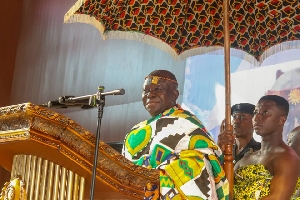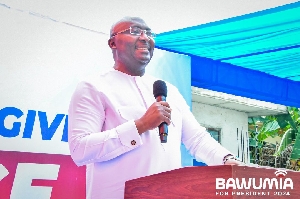Opinions of Friday, 16 August 2013
Columnist: Sakyi, Kwesi Atta
Legacy of the Danquah-Busia and Nkrumah traditions
Reflections -Legacy of the Danquah-Busia and Nkrumah traditions – Part 1
Nkrumah articulated his firebrand Pan-Africanist ideology in many of his classic writings such as Neo-Colonialism- the Last Stage of Imperialism, Consciencism, and Dark Days in Ghana, among others. Nkrumah, like Hitler, used the megaphone of the radio to win followers to his ideals.
Through his fiery speeches which he often gave in dawn broadcasts, he appealed to the conscience of his adversaries to do the right thing, and in the same breadth, he heaped criticisms on their inhuman stance and double standards. Nkrumah was beside himself with rage on occasions such as during the testing of the atomic bomb on the Sahara Desert in Algeria by General de Gaulle of France in 1960, the Unilateral Declaration of Independence in Southern Rhodesia in 1965 by Ian Smith, the assassination of Patrice Lumumba, Joseph Okito and Maurice Mpolo in 1961 during the then Congo-Leopoldville-Katanga imbroglio, perceived to have been perpetrated by enemies of Africa. The conflict engulfed feuding nationalists such as Cyril Adoula , Moise Tsombe, Joseph Kasavubu and Mobutu Sese Seko.
Nkrumah got himself and Ghana embroiled thick in the eye of the storm between the East and West during the Cold War Era. Nkrumah gave teeth to his firebrand Pan-African mantra of continental unity and his clarion call for the establishment of the African High Command, by being the first African country to send Ghanaian troops to the then Belgian Congo, when the UN Secretary General, Dag Hammarskjold, asked for UN Peacekeeping troops. Perhaps, Nkrumah was the precursor of what today is called Africom. Hence, subsequent Ghana's UN involvement in many peacekeeping missions around the world, in places such as Kosovo, Bosnia, Mali, Somalia, Lebanon, Liberia, Sierra Leone, Sudan, Ivory Coast, Rwanda, among others.
Nkrumah’s trenchant foreign policy of non-alignment, positive neutrality, and Afrocentric proclivity created numerous enemies far and wide for Ghana. Ghana, during his time, became the Mecca for freedom fighters and exiles from places such as Angola, Guinea Bissau, South Africa, Zimbabwe and Namibia. Ghana’s foreign policy, though Afrocentric, was ambivalent as Nkrumah earlier on had obtained capital funding from the USA, under Presidents Eisenhower and J.F.Kennedy, to construct the Akosombo Hydro Electric Power Station, and the Volta Aluminium Company (VALCO). Later in his reign, Nkrumah shifted Ghana's foreign policy focus to tilt heavily to the far left of centre, leaning on aid from Eastern bloc countries like USSR, China, erstwhile East Germany, and the then Eastern bloc countries.
Thus, Ghana was caught in the ugly throes of being on the horns of a dilemma. Nkrumah established the Ghana Airways, the Black Star Shipping Line, the State Transport Corporation (STC), State Construction Corporation (SCC), Ghana National Trading Company (GNTC) and the Ghana Commercial Bank (GCB), as parastatals or public corporations. In those days, there were jobs galore, as many school-leavers easily found jobs in the parastatals and governmental outfits such as the Workers' Brigade and the Young Pioneers. The Workers' Brigade was a very productive outfit which engaged in farming and other productive ventures.
Nkrumah founded the Tema City, and set up the Kwabenya Atomic Reactor, ostensibly for peaceful purposes. However, his motives for such grandiloquent enterprises were misread and misconstrued. It is however, difficult now to read into his ulterior motives as at his time, as Ghana was fishing in troubled waters and sailing closely to the maelstrom. The institutions established by Nkrumah helped a lot in propping up employment, and providing competition to well-established foreign multinationals such as UAC, now known as Unilever.
They were mostly viable institutions, except for Ghana Airways where a lot of corruption and nepotism reared its ugly head. Had it not been for the unnecessary military interventions and ill-advised outright sale and hiving off (privatization) of those state-owned enterprises after 1966, Ghana would have gone far in her development agenda, and perhaps, would have been at par with countries such as Malaysia, South Korea, Singapore and Indonesia.
Our drastic 180º paradigm shift from a centrally-planned model to a pure rightist free market-driven development trajectory, has led to the current loss of altruism and patriotism, paving way for the ascendancy of parochialism, plutocracy, tribalism, aristocracy, theft, politics of looting and insults and development paralysis. Ghana had no time for a smooth transition, and the aftermath of that disastrous turnaround, it was a free-for-all pillage and looting of state assets under the military generals and their favoured clique. Right now, our development trend is looking downwards because of leadership crisis. Looking back at Nkrumah’s legacy, one can see that the man embraced every tribe in his cabinet, as he went for meritocracy instead of mediocrity.
His cabinet had names from all across the tribes of Ghana, names like J.E Hagan, W.K. Arthur, L. Abavana, E.K.Bensah, Benigbengor Blay, Dowuona Hammond, E.K. Goka, Imoro Egala, Nkumsah Mumuni Bwawunia, J.H. Alhassan, Kofi Baako, Kojo Botsio, Grace Ayensu, K.A. Gbedemah, Asafo Adjaye, Ako Adjei, Caseley Hayford, Krobo Edusei, N.A. Welbeck, Provencal, J.A. Jantuah, Quaison Sackey, among others.
On the Trade Union front, we had the firebrand supremo, John Tettegah, who was later to be upstaged after Nkrumah’s overthrow by B.A. Bentum, at the OATUU level. On the intellectual level, we had Prof Kojo Abraham, Ofosu Armaah, R.P. Baffour, Evans Anfom, A,A, Kwapong, among others.
Nkrumah knew how to network, as he struck personal friendships with leaders such as Chou En Lai of China, Nikita Kruschev of the USSR, Bronz Tito of Yugoslavia, Sukarno of Indonesia, John G Diefenbaker of Canada, Ramon Magsaysay of the Phillippines, Tunku Abdul Rahman of Malaysia, among others. Nkrumah’s proactive sports policy produced a world class administrator, Ohene Djan, sportsmen and women such as tennis stars Okine Quaye, Esther Lamptey, Ethel Jacks, athletes, Alice Anum & Mike Ahey, boxers such as Eddie Blay, Floyd Robertson, Roy Ankrah, Oblitey Commey, and Joe Tetteh, footballers, Aggrey Fynn, Baba Yara, Dogo Moro, Salisu, Edward Acquah, Kwame Adarkwa, Ofei Dodoo, Dodoo Ankrah, Addo Odamtey, Addoquaye Laryea, among others. Nkrumah encouraged sportsmen and women by giving them lots of incentives.
To ensure discipline, Nkrumah personally led by example, as he worked around the clock. He established a powerful secret service which oversaw both internal and external security, thus ensuring that crime was kept to the minimum through pre-emptive crime prevention and detection. Nkrumah disciplined his ministers, as his intelligence agents kept an eagle eye over their performance. He often carried our cabinet reshuffles to prevent entrenched corruption. The Nsawam Maximum Security Prison became our own equivalent of Alcatraz or Bastille or Guantanamo Bay.
The mere mention of the prison’s name was enough to strike terror in the hearts of potential criminals. We cannot say the Matemeho-Dombo tradition did not leave us a legacy. During Kufuor’s 8 year reign, he ensured the flourishing of freedom of speech as well as the flourishing of real multiparty democracy, by running an all- inclusive government. He often included on his foreign tours, a retinue compromising both opposition and ruling party MPs.
He raised high the flag of Ghana at international fora, where due to his sagacity, humility and dignified mien, he chaired ECOWAS and AU. I doff off my hat to John Agyekum Kufuor, who is a real statesman. Ironically and interestingly, J.J. tried in his reign to obliterate the image of Nkrumah in an attempt to raise his own profile. That, coming from one who had largely benefitted a lot from Nkrumah's largesse, and he was expected to reciprocate the gesture. It was rather Kufuor, from the Danquah-Dombo-Busia stable of politics who did a lot for the Nkrumah family.
It may be too early to say, however, but the signs are there to see that our current political leaders do not measure up to the standards set in the past. We are proud to honour our heroes, living or dead. We have the annual Danquah Memorial Lectures given at the Cape Coast University, to honour the man who is often referred to as the Doyen of Ghana politics, and the architect of the University of Ghana, Legon, my alma mater.
We are privileged to have Kwame Nkrumah Circle and Danquah Circle right in the capital city, as well as Ako Adjei Interchange, Obetsibi Lamptey Circle, Tetteh Kwarshie Hospital, Kwame Nkrumah Mausoleum erected under the watch of J.J. Rawlings, W.E.B. Du Bois Centre, Kwame Nkrumah University of Science and Technology, Okomfo Anokye Hospital, among many other monumental pieces which honour our past leaders and heroes.
Which of our current living leaders will be honoured by posterity? A great leader is one whose legacy far outlives him or her when he or she is long gone. Who in Ghana has not heard about the exploits of Yaa Asantewa, Ekem Ferguson, Kwegyir Aggrey, Ephraim Amu, Major Seth Anthony and Brigadier Odartey Wellington?
Again, let us reflect on President Obama’s wisdom which he shared with us in Accra in 2009, when he said, 'Africa does not need strong men but strong institutions.' How true and relevant this is in our time, when our Supreme Court, Electoral Commission, and the Executive arm of government are engaged in unravelling post-election results aftermath. This is a litmus test for our institutions to show their pedigree that they are really strong, and they are a cut above the rest.
Contact:kwesiattasakyi449@gmail.com












